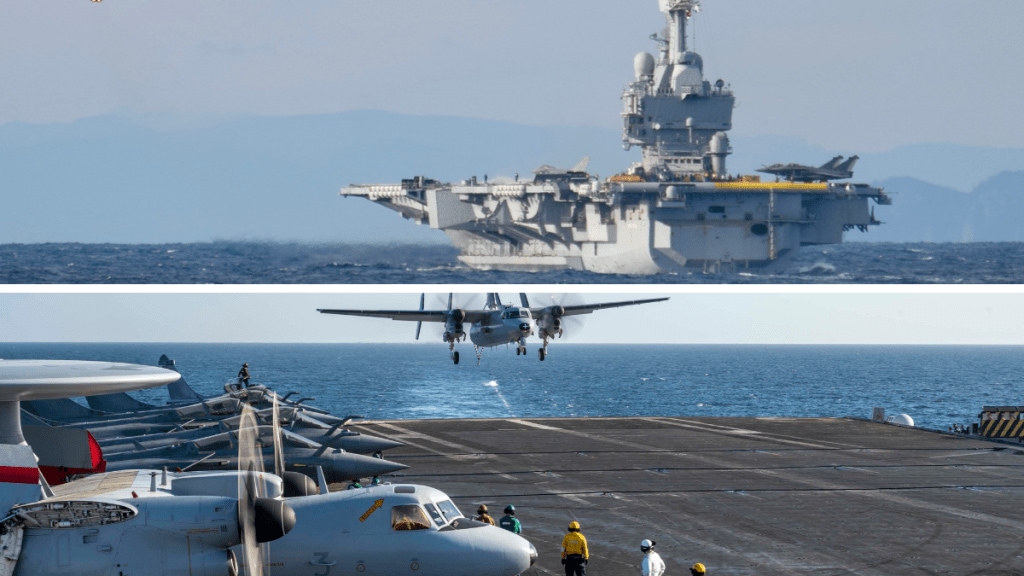In an assertive demonstration of naval strength and strategic partnership, the French Carrier Strike Group (CSG) will arrive in India on January 4, 2025. With its flagship FNS Charles De Gaulle, accompanied by its air fleet and escort vessels, the French Navy is not only showcasing its military might but also reinforcing its commitment to Indo-Pacific security. The stopovers in Goa and Kochi are set to become a key moment in the ever-growing India-France defence relationship and in securing vital maritime trade routes.
Strengthening a Strategic Powerhouse
The India-France partnership has evolved into a defining alliance for regional stability, particularly in the face of growing maritime threats. India, a rising global power, and France, with its strategic interests in the Indo-Pacific, have deepened their military ties over the past 20 years. From joint military exercises like Shakti and Garuda to the high-profile Varuna naval drills, their defence cooperation has become a cornerstone of Indo-French relations.
As the French Carrier Strike Group docks in India, both nations will take their collaboration to the next level with the 42nd Varuna exercise—an annual joint drill aimed at refining naval strategies, ensuring interoperability, and enhancing their ability to counter evolving maritime threats. This isn’t just a military exercise; it’s a powerful statement of readiness to respond to regional challenges, from naval warfare to humanitarian missions.
Facing Shared Maritime Challenges
The Indian Ocean, often called the “lifeblood of the world’s trade routes,” is increasingly contested. Its strategic importance cannot be overstated, with trillions of dollars of global trade passing through its waters each year. France and India, both maritime powers with vital stakes in the region, have long understood the importance of safeguarding these routes. The French CSG’s visit highlights not just military power but the two nations’ commitment to a free, open, and secure Indian Ocean.
Since 2008, France has been a key partner in India’s Indian Ocean Naval Symposium (IONS), a regional framework designed to address shared maritime security challenges, including piracy, illegal fishing, and pollution. This collaboration strengthens the effectiveness of 25 member nations working together to enhance collective maritime security.
In addition to bilateral efforts, France has been at the forefront of global operations such as the European ATALANTA mission to combat piracy off the Horn of Africa and the Combined Task Force 150, which targets illicit trafficking and maritime crime. France’s involvement in these multinational missions underscores its vital role in maintaining order on the high seas—a role it continues to share with India.
Power Play in the Indo-Pacific
While the visit of the French Carrier Strike Group is significant, it also symbolizes a broader shift in the Indo-Pacific. With increasing geopolitical tensions and rising maritime threats, France’s presence in the region acts as a counterbalance to other global powers vying for influence. As two like-minded nations with shared democratic values, India and France are not just safeguarding their own interests but also contributing to global maritime stability.
Exercises like La Perouse, which brings together multiple countries in joint operations, exemplify the growing importance of multilateral cooperation. For both India and France, these engagements are about more than just defence—they are about ensuring that sea lanes remain open and secure for all.
The Road Ahead: More Than Just Ships in the Water
The arrival of the French Carrier Strike Group marks a new chapter in India-France naval cooperation. This visit is not merely symbolic; it is a tangible demonstration of both nations’ commitment to strengthening regional security and maintaining the stability of the Indian Ocean. As global maritime challenges evolve, the partnership between India and France will be crucial in shaping a future of free, open, and secure seas.
Both nations recognize that the challenges of the 21st century cannot be solved by one country alone. With shared interests in countering piracy, trafficking, and environmental threats, their collaboration is a model for how strategic allies can work together to preserve peace in increasingly contested waters.
As the French CSG sails into India’s ports, it brings with it not just the power to deter but the promise of a future where nations work hand-in-hand to secure the maritime commons for all.

